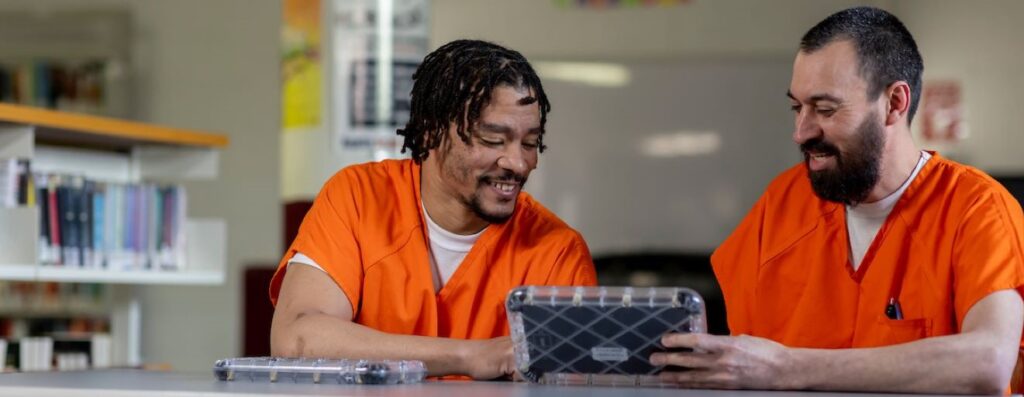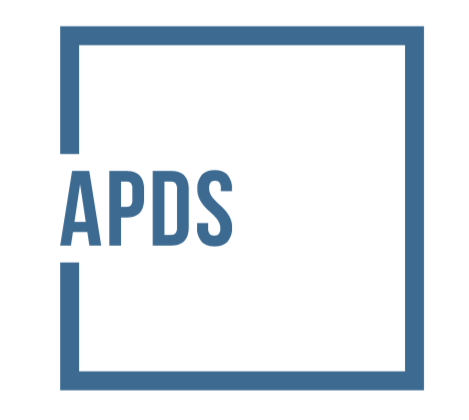Challenge
Addressing Educational Barriers Faced by Incarcerated Individuals
According to the Prison Policy Initiative, “1.9 million people are locked up in more than 6,000 U.S. correctional facilities,” constituting a crisis of mass incarceration.
Kimonti Carter, educational consultant and curriculum creator at APDS, knows firsthand that education, which includes education in job and enduring skills necessary to secure a living wage career, is the most powerful tool to combat systemic injustice and break the cycle of incarceration. “Education freed me – literally,” says Carter, who was released in the fall of 2022 from his life sentence without the possibility of parole. His freedom came partly because of his leadership in creating and participating in “T.E.A.C.H.” (Taking Education and Creating History), an innovative prisoner self-education program.
Carter’s story “is a stark example of the educational barriers faced by incarcerated individuals in Washington State prisons. Anyone with a sentence exceeding seven years is denied educational services,” explains Dr. Cindy Parrish, curriculum manager at APDS. In Michigan, 7,300 justice-impacted persons are on a waitlist to garner a GED or High School Equivalency Diploma. “There are not enough seats nor teachers to support a course of study so that they can sit for the GED or HSE exam.”
Even when incarcerated students are fortunate enough to receive educational services, the curriculum may have little bearing on their lives; teachers struggle to motivate and connect with their students on a personal level. “Students are not met where they’re at,” Chris Wilson, educational consultant and curriculum creator at APDS, explains. “All of us learn better when we are motivated by excellent teachers who’ve experienced similar challenges as we have – who’ve been there and get where we’re at.”

Solution
Empowering Incarcerated Individuals for Self-Driven Success
The APDS educational team worked with formerly incarcerated teachers to create two Brightspace courses, “The Master Plan” and “Liberation Education.” Like all of the secure education technology products and services on the APDS platform, these courses are offered at no cost to the justice-impacted individuals or their families.
“For APDS’s incarcerated learners, teachers with inside knowledge, with relatable experiences are much more impactful. These teachers can explain why a student might want to engage in a particular educational activity or certification,” says Parrish. “They can demonstrate why creating a community-led college inside the prison, or writing your own master plan can lead to a whole host of positive outcomes, including becoming free and getting a living wage career.”
“The Master Plan” is a ten-unit module designed to help incarcerated learners build their capacity for self-driven success, think beyond their current circumstances and architect a master plan to achieve their life and career goals. “The course is based on my book, “The Master Plan: My Journey from Life in Prison to a Life of Purpose,” says Wilson. “I tell my story throughout the course, inviting students to tell their stories and create their own master plan. We commit to doing the work together.”
Designed to be either self-guided or facilitated, APDS also offers “Facilitating The Master Plan,” a teacher-facing version for Dept. of Corrections staff, high school or college teachers, facilitators, expressive arts therapists and counselors. The end of each unit includes downloadable “Facilitators Guides” to help facilitators work individually or with cohorts of students, encouraging deeper reflection, powerful group discussion and profound personal accountability.
The assistance provided by D2L was a huge uplift in creating HTML templates that are ready to use. The courses are highly engaging and interactive. Students can expect to have access to a wide range of digital educational tools, including video interviews, flip cards, slide shows, panels that link to relevant resources, user-friendly ‘Socratic Question Tool’ response pages, surveys for course improvement as well as an opportunity to ask questions.
Tyler Coon, Director of Product, APDS.
Unlocking Potential through Self-discovery
Leveraging the capabilities of Creator+ to seamlessly add interactive elements, a new course, “Liberation Education” was created and rolled out in early 2023. This course accompanies the award-winning documentary, SINCE I BEEN DOWN, which features Kimonti Carter on the inside of a Washington State prison. Now released from prison because of the power of education, Carter teaches by example. “By doing a sociological imagination memoir that starts with my story of joining a gang in Tacoma, Washington at the age of 11 and then noticing how the war on crime affected that story, I show students of “Liberation Education” how to develop their own sociological imagination by researching how social forces, laws, and policies have affected their personal journey. I talk about how my community and I created T.E.A.C.H. and all the good that happened because we made this college where we taught each other. And I show them how to make their own pro-social educational group that will do good for their community, by their community.”
Carter and Wilson also teach students of “Liberation Education” and “The Master Plan” how to leverage the APDS tablet career pathway tools and educational programming in order to gain important skills in preparation for a living wage career.
With these Inside Knowledge courses, APDS is empowering incarcerated learners by inviting them on a guided path of self-discovery, goal setting, and preparation for the rigor of career pathways along-side formerly incarcerated teachers.
Result
The Power of Inspiration
Since launching “The Master Plan”, APDS has helped over 20,000 unique learners unlock their potential and achieve their personal and career goals through innovative and accessible learning solutions. On average, 550 learners a week have accessed the course.
One APDS learner from New York shared their master plan for success—creating an apparel business with proceeds going towards helping people with vision impairment. “Your story, Chris, and this course helps me every day,” the learner reveals. “I want to continue my education because I have a scholarship to go to college, and it’s one of the greatest things I have achieved ever, while incarcerated.”
“The Master Plan” improved engagement rates in other educational programs when coupled with a 90-day “motivational messaging” program, students spent 33% more time accessing adult basic education, GED programs and college-level education.
“Facilitating the Master Plan” has received positive feedback from DOC staff. A district director from Iowa expressed how it has helped their teams deepen their learning and be intentional with students. “I personally learned so much and feel like I have a clearer idea of how to take the fantastic course you have built from the virtual world into face-to-face discussions both individually and in small groups,” the district director adds.
A heartfelt letter received from an incarcerated student in Tennessee highlights the true power of inspiration. Despite being sentenced to 14 and half years in prison, this learner found hope and motivation through Kimonti Carter’s story. “After hearing your story, I realized that something good could come of this. My goal is to start a group like T.E.A.C.H when I’m in state prison to be able to help young women learn to love themselves, no matter what life has thrown at them.”
“We’ve challenged ourselves to ensure 1 million justice-impacted individuals achieve a living wage career by 2025 and the D2L Inside Knowledge courses are an important part of meeting that challenge. I Co-Founded APDS in 2014, with the notion of scaling educational opportunities to incarcerated learners through technology devices. Education is key and the ability to transform corrections from a place of warehousing to a space of rehabilitation, is critical to our mission at APDS,” concludes Arti Finn, co-founder of APDS.
